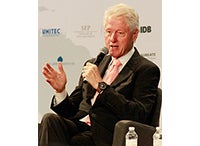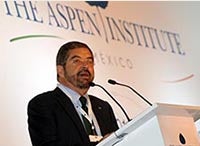Brazil is a young democracy. In 1822 we declared independence from Portugal, and in 1889 we became a Republic. Then in 1964 Brazil was the stage of a right-wing military coup that resulted in a dictatorship (although a much milder one compared to our Latin American neighbors) for the next 21 years. Finally, Brazil once again regained its democratic credentials in 1985 and has strengthened its institutions ever since. One president, Fernando Collor was impeached in 1992 on corruption charges. Brazil’s institutions held fast and we have elected and re-elected three presidents, from different political parties, ever since. With about 30 political parties, the Brazilian Congress is very fragmented. This forces an unnatural and unstable coalition between whichever party is in power and several other parties.
In the last twenty years Brazil has seen real progress. Its economy grew, inequality fell (rather rapidly in the last decade) and it felt like Brazil’s time had finally arrived. Then in the last few years, our economy stalled and then quickly contracted in an unprecedented way. People began to doubt the economic policies enacted by the recently re-elected government which had campaigned on a platform diametrically opposed to the actions they actually took in early 2015. At the same time, a young judge stationed in Curitiba, the capital of the southern state of Parana, began a corruption investigation that soon would prove staggering: the so-called Lava Jato scandal.
For the first time, leading business people and politicians were held accountable for misdeeds and sent to jail. The team of prosecutors worked methodically to uncover a long chain of bribes and graft, and so far no high-profile criminal lawyer or politician has been able to avoid justice. Echoes to the famous (and later infamous) Mani pulite investigation in Italy abound. The Brazilian Supreme Court has upheld 95% of the harsh sentences passed by the judge, Sergio Moro. The Court has also collaborated in the prosecution by changing the law, forcing people convicted in the investigation to begin serving time as soon as the court of appeals had affirmed the verdict. (Previously, it could take years for anyone to start serving time.)
Another innovation: a type of plea bargain — common elsewhere — which permitted the state to reduce prison time for accused individuals in exchange for evidence of further crimes became lawful. These deals gained enormous popular support, and the results caught fire. It did not help the party leading Brazil’s government, which saw many of its senior politicians and appointees get caught up in the Lava Jato scandal. Leaders from allied parties and even some from the opposition were implicated.
For the second time in half a century, Brazil faces an impeachment process. The process followed every rule of due process and was closely guided by the Supreme Court. (The people of Brazil suddenly know the names of ever justice on the Supreme Court.) More than two thirds of the Lower House voted for the impeachment of President Dilma Rousseff. The Senate initially upheld the vote and will vote again in the next six months for the impeachment to become permanent. Meanwhile, a constitutional — although not popular — replacement government took power, led by Vice President Michel Temer, who would serve until the end of 2018 if President Rousseff is indeed impeached. Temer has a herculean task of limiting public spending, restoring meritocracy to state-owned loans and policies, and reviving the economy, which will require painful but necessary changes like reforming our retirement laws. It remains to be seen if he can succeed.
The lack of leadership demonstrated by the most senior politicians in this melee, across almost the entire political spectrum, is remarkable. Rousseff’s predecessor Luiz Inácio Lula da Silva and their party (known as PT) betrayed the confidence of the majority of the public, while the opposition demonstrated they had less than noble motives for the impeachment process. In the end, there is no vacuum in politics, and an arrangement was reached. The few positive aspects of this process have included public support for the anti-corruption investigation, the media’s relentless effort to uncover wrongdoings and the Courts’ careful management of the prosecutions, this time with overwhelming popular support.
The people of Brazil show strong signs of mistrust towards almost all political parties and politicians. They continue to support the Lava Jato investigation and the Supreme Court. Even though it is undeniable Brazil is in the middle of a political and economic crisis, there are positive signs of a young democracy coming of age: institutions are working; political debate, although extremely heated, has not resulted in any kind of disruption. Furthermore, the lack of leadership by the former President Rousseff coupled with the spirited leadership of a young judge, helped by an incredibly well-trained team of prosecutors, are proving to be too strong a combination for corruption to withstand. The status quo in Brazil may never be the same.

